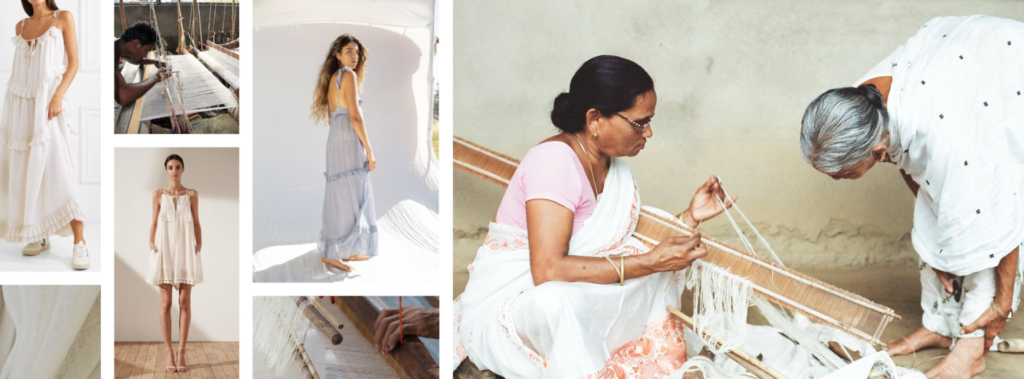India’s apparel industry stands as one of the largest in the world, with a significant presence in both domestic and global markets. The country is not only a leading producer of textiles but also a major exporter of garments, contributing substantially to the global supply chain. With an estimated market revenue of over US$105 billion in 2024, India is a key player in the global apparel sector. This booming market is fueled by a combination of factors, including India’s growing urban population, rising disposable incomes, and a strong domestic demand for both ethnic and Western clothing. The country’s apparel industry is expected to continue expanding, with projections suggesting a steady annual growth rate of around 3.35% from 2024 to 2029.
In recent years, the apparel industry has faced increased scrutiny over its environmental footprint, especially in the context of global sustainability goals. As concerns about climate change, resource depletion, and pollution mount, sustainability has become a central focus for industries worldwide, including fashion. India, with its vast textile industry, finds itself at a unique crossroads. On one hand, the country has a rich tradition of sustainable practices embedded in its cultural heritage, such as the use of natural dyes, handloom weaving, and other artisanal techniques. On the other hand, the rapid industrialization and mass production practices of the modern apparel sector have led to significant environmental and social challenges. This duality places India in a distinct position, where it has the opportunity to blend its traditional craft techniques with modern sustainability practices to pave the way for a greener and more socially responsible apparel market.

Key Drivers and Trends in Sustainable Apparel
The shift towards sustainability in India’s apparel industry is being driven by a variety of interconnected factors, which reflect both global and domestic changes in consumer preferences, technological advancements, and societal shifts. These drivers highlight a growing awareness and demand for more sustainable, eco-friendly, and ethically produced apparel in the Indian market.
- Consumer Demand for Eco-Friendly and Ethical Products
One of the most significant drivers of change in India’s apparel market is the growing consumer demand for eco-friendly materials and ethically made products. As the global fashion industry becomes more attuned to the environmental and social impacts of apparel production, Indian consumers are increasingly making conscious purchasing decisions. According to Statista, India’s apparel market is expected to generate approximately US$73.19 per person in 2024, reflecting both an increase in disposable income and a shift toward more thoughtful consumer behavior. Consumers are increasingly prioritizing eco-friendly materials like organic cotton, recycled fabrics, and sustainable fibers over conventional, resource-intensive options. This trend is especially prominent among younger urban consumers who are more attuned to issues of sustainability and social responsibility.
As more information becomes available about the environmental impacts of fashion, consumers are willing to pay a premium for clothing that aligns with their values. The growing demand for eco-friendly fabrics is also complemented by a desire for transparency, with consumers seeking out brands that are open about their sourcing, production processes, and labor conditions.
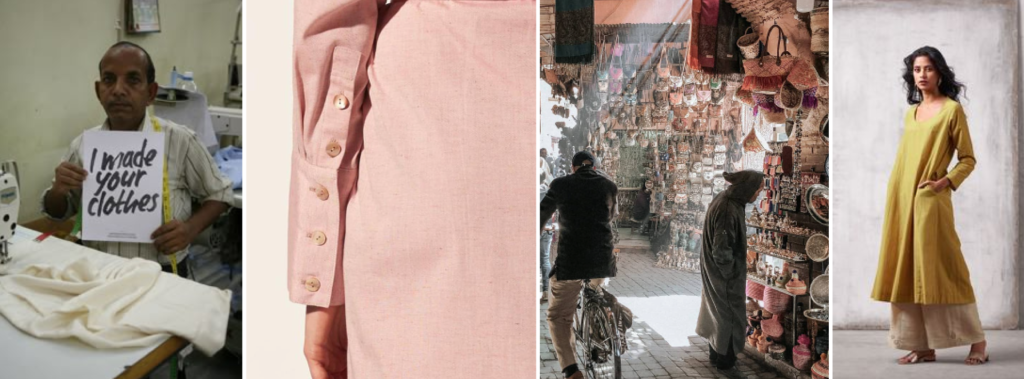
- E-Commerce Growth and Technological Advancements
E-commerce is a key factor contributing to the rise of sustainable fashion in India. The digital retail landscape has expanded significantly, offering consumers easier access to a wide variety of sustainable clothing options. The rise of online platforms, powered by artificial intelligence (AI) and machine learning, is helping consumers discover eco-conscious brands, compare prices, and make informed decisions. Virtual try-on technology, which allows consumers to visualize how clothes will look and fit before purchasing, has further enhanced the online shopping experience, especially for sustainable and ethically produced apparel. This technology reduces returns, thereby minimizing waste and returns-associated carbon emissions.
Additionally, e-commerce platforms have made it easier for smaller, independent brands that focus on sustainability to reach a broader audience. As of 2024, the Indian apparel market is projected to see significant growth, with online sales expected to contribute more to the overall revenue. Consumers are increasingly turning to e-commerce for convenience, product variety, and, importantly, the ability to access products that align with their values, including sustainability.
- Urbanization and Rising Incomes
Urbanization and rising disposable incomes have had a profound impact on India’s apparel market. The urban population in India is steadily growing, and with it, the demand for branded retail has increased. As more consumers in urban areas can afford branded and sustainable apparel, the shift from unbranded to branded retail is becoming more evident. Branded and higher-end apparel often includes sustainability as a core part of its value proposition. As incomes rise, consumers are more likely to make purchasing decisions based not only on price but also on quality, ethics, and sustainability.
According to Statista, the Indian apparel market is projected to grow at an annual rate of 3.35% (CAGR 2024-2029), reflecting increased consumer spending, especially in urban areas. This demographic shift is propelling the demand for more sustainable options, with urbanites increasingly favoring products made with eco-friendly materials and manufactured under ethical conditions.
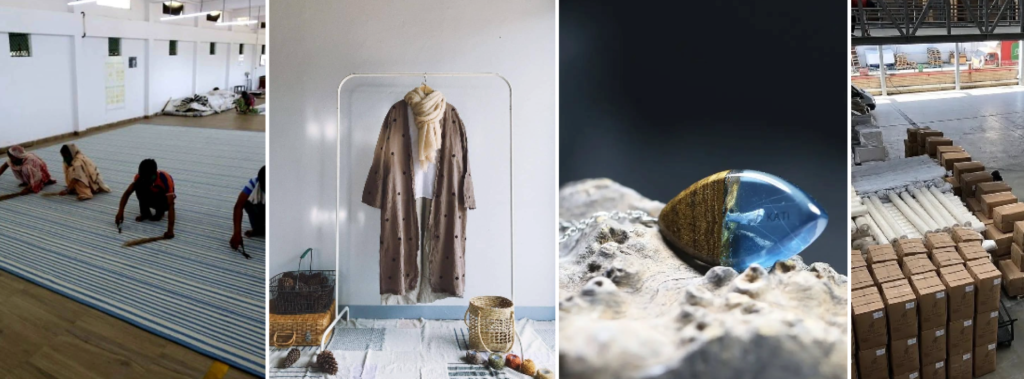
- Active Lifestyle Trends: Rise of Athleisure and Sportswear
Another key trend shaping the Indian apparel market is the rise of athleisure and sportswear, driven by a growing focus on health, fitness, and active lifestyles. This trend is particularly pronounced among younger, urban populations who are increasingly integrating fitness into their daily routines. As this demographic grows, there is a rising demand for athleisure and sportswear that incorporates sustainable attributes such as organic cotton, recycled polyester, and other eco-friendly materials.
Sustainable Production Practices in the Indian Apparel Market
India’s apparel industry is increasingly adopting eco-friendly production practices, as sustainability becomes a key focus for manufacturers and consumers alike. These sustainable practices are not only in response to growing consumer demand for environmentally responsible products but also part of a broader global movement to mitigate the fashion industry’s environmental impact.
- Use of Organic and Recycled Materials
One of the primary sustainable production practices in the Indian apparel market is the increasing use of organic and recycled materials. Organic cotton, for instance, is gaining popularity in India due to its reduced environmental footprint. Compared to conventional cotton, organic cotton requires fewer pesticides and fertilizers, making it less harmful to both the environment and workers involved in its cultivation. It also uses significantly less water during production.
Recycled materials, particularly recycled polyester, are also being utilized to reduce waste and minimize reliance on virgin resources. Additionally, recycled polyester is an affordable and widely accessible option, making it a practical choice for manufacturers aiming to balance sustainability with cost-effectiveness. It is made from post-consumer waste like plastic bottles and textile scraps, which helps divert waste from landfills while offering a more sustainable option for the fashion industry. This material is increasingly being used in athleisure and sportswear lines, which are growing segments in India’s apparel market, as noted in the industry’s growth trends.
By shifting to these more sustainable materials, Indian manufacturers can reduce their ecological footprint, while consumers enjoy high-quality products made from more responsible sources.
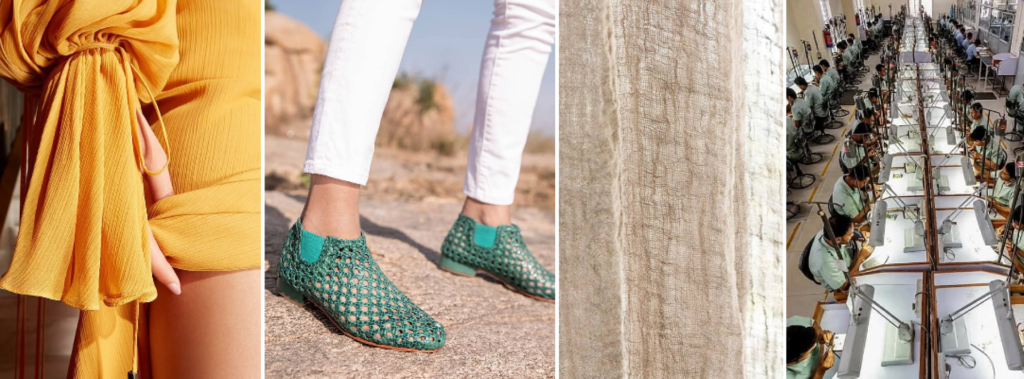
- Efficient Resource Management
Efficient resource management plays a crucial role in sustainable apparel production. Water usage, in particular, is a major concern in India, as textile manufacturing is one of the largest water-consuming industries worldwide. In response to water scarcity, many Indian manufacturers are adopting innovative water management practices, including water recycling and wastewater treatment systems. These methods enable manufacturers to reuse water in dyeing and finishing processes, significantly reducing overall water consumption.
Additionally, many Indian textile manufacturers are investing in energy-efficient technologies, such as solar power, to power their operations. By using renewable energy sources, companies can cut down on their carbon emissions and contribute to India’s broader environmental goals. Waste reduction practices, including upcycling and minimizing textile waste during the production process, are also becoming more common. These efforts not only help reduce environmental impact but also reduce production costs over time.
- Traditional Handloom Techniques
India’s rich tradition of handloom weaving is also a key contributor to sustainable apparel production. Handloom textiles, which are produced manually with minimal energy, are inherently more sustainable than mass-produced textiles. The slow, artisanal process of handloom weaving uses natural fibers like cotton, silk, and wool, which are often grown and processed with fewer chemicals and pesticides compared to industrially produced fibers.
Handloom production emphasizes small-scale manufacturing, which allows for better quality control and less waste. These textiles are often produced in rural areas, where they provide a crucial source of income for local artisans and support rural economies. By reviving and modernizing traditional handloom techniques, India can simultaneously preserve its cultural heritage and promote sustainable production practices that reduce environmental harm.
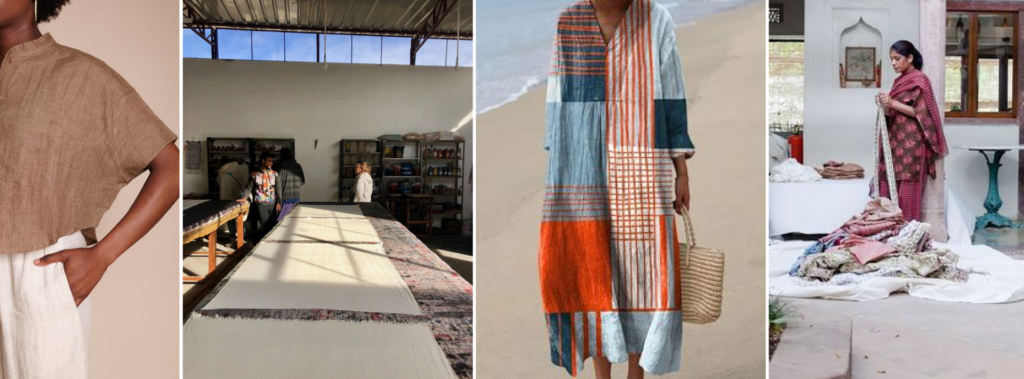
Challenges to Sustainability in the Indian Apparel Sector
Despite the growing adoption of sustainable practices, there are several challenges that hinder the widespread implementation of sustainability in India’s apparel sector. These barriers need to be addressed in order for the industry to fully transition to more sustainable production models.
1. High Costs of Sustainable Raw Materials and Production Methods
A major challenge to sustainability in the apparel industry is the higher cost of raw materials like organic cotton and recycled polyester. These materials are typically more expensive to produce and source than conventional fabrics. As a result, apparel brands may hesitate to adopt them, particularly when targeting price-sensitive markets. Additionally, the cost of implementing sustainable production methods, such as water recycling systems or renewable energy infrastructure, can be prohibitively high, especially for smaller manufacturers with limited access to capital.
2. Limited Access to Technology and Infrastructure for Small Manufacturers
A significant portion of India’s apparel industry comprises small-scale manufacturers and artisans who may not have access to the latest sustainable technologies or infrastructure. Many small businesses lack the capital or technical expertise to implement sustainable practices, such as water treatment systems, energy-efficient machinery, or eco-friendly production techniques. Additionally, small manufacturers often face difficulties in obtaining organic raw materials or meeting sustainability certifications, which can make it harder to compete with larger brands.
3. Consumer Awareness and Price Sensitivity
While consumer demand for sustainable products is growing, there is still a significant portion of the market that prioritizes price over sustainability. Many Indian consumers, particularly in rural areas, may not be fully aware of the environmental and social impacts of apparel production. Price sensitivity remains a challenge, as eco-friendly products are often priced higher than conventional alternatives. In a price-conscious market like India, this can deter consumers from choosing sustainable options, especially when they perceive them as less affordable or not widely available.

The Role of Deepwear in Shaping the Future
At Deepwear, our mission is to make an impact not only in fashion but also in how we approach production, distribution, and sustainability. By offering integrated solutions that combine design, manufacturing, and distribution services, we empower brands to meet the growing consumer demand for sustainable products without compromising on quality or style. Our commitment to transparency, integrity, and ethical manufacturing processes drives the creation of a more sustainable fashion ecosystem—one that benefits both the planet and its people.
Our offices in Mumbai and Delhi provide hands-on support and localized expertise throughout the manufacturing process. This dual presence is a significant advantage for brands navigating India’s vibrant but complex production landscape. Mumbai serves as a hub for design innovation and access to premium raw materials, while Delhi offers proximity to a wide network of skilled artisans and large-scale manufacturing facilities. Together, these locations ensure rigorous quality control, timely project management, and direct communication with factory partners.
Clients trust us to mitigate risks commonly associated with overseas manufacturing, such as inconsistent quality or supply chain delays. Our local presence guarantees compliance with ethical standards, from fair wages to eco-friendly practices, aligning seamlessly with our commitment to sustainability. By partnering with Deepwear, brands gain cost-effective solutions without compromising on quality or reliability.
Furthermore, our collaboration with global clients and our focus on sustainable sourcing practices are pivotal as we scale the sustainable apparel sector. Whether working with smaller sustainable brands or larger corporations, Deepwear drives systemic change across the value chain—from raw materials to finished products. By helping brands meet the demand for ethical clothing, we are setting the standard for what sustainable fashion should look like, not only in India but across the globe.
